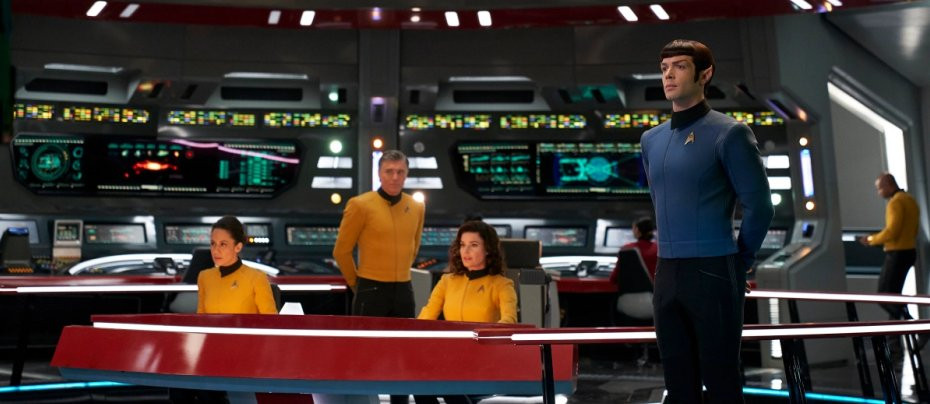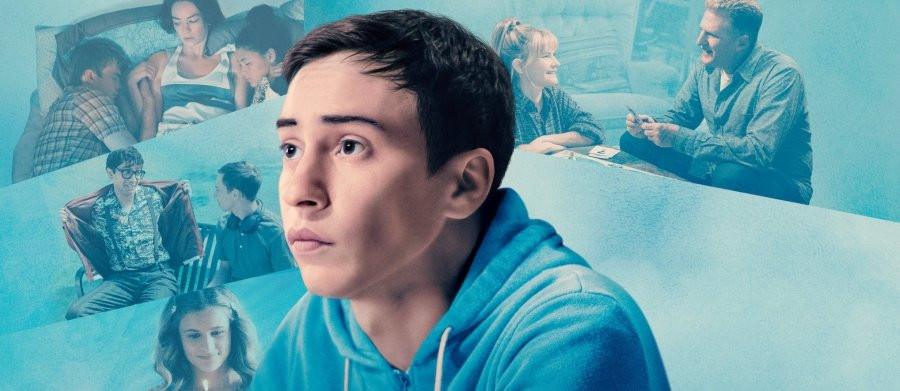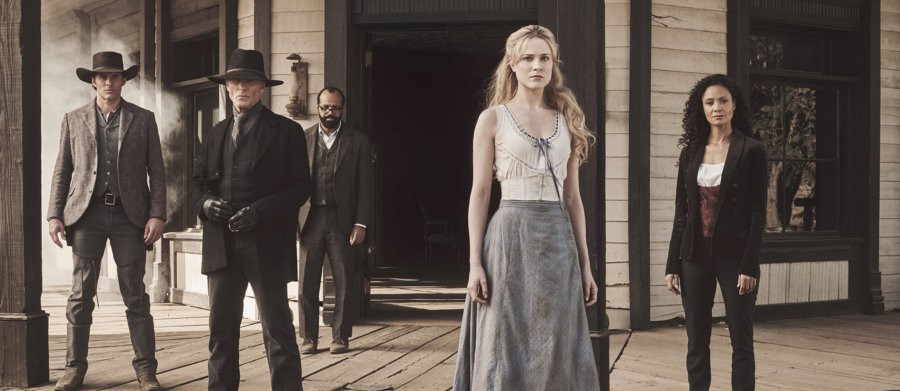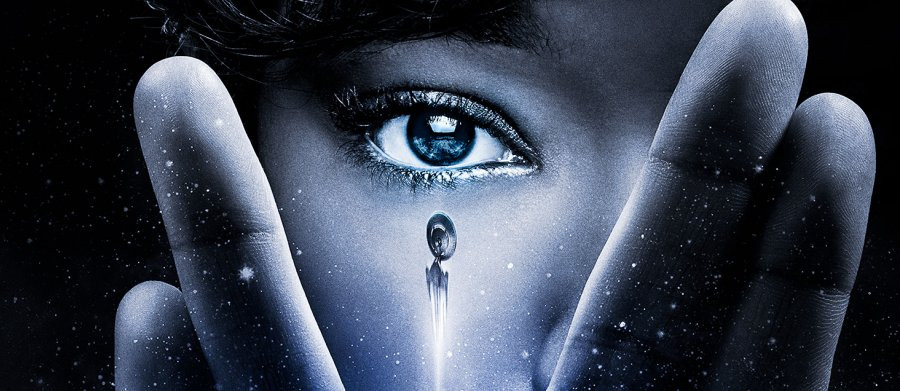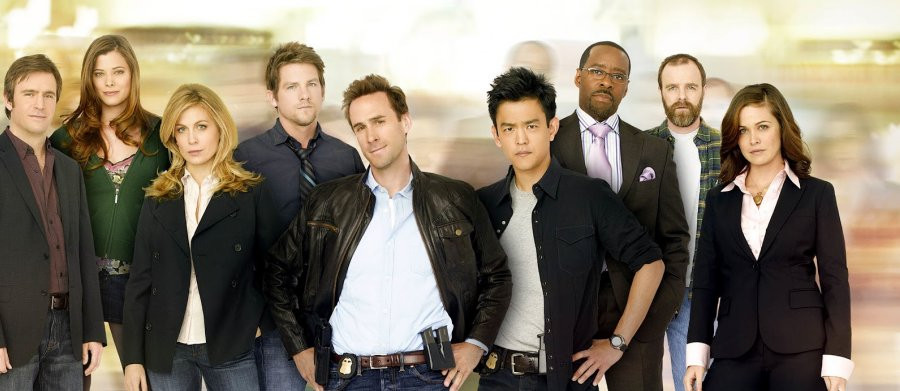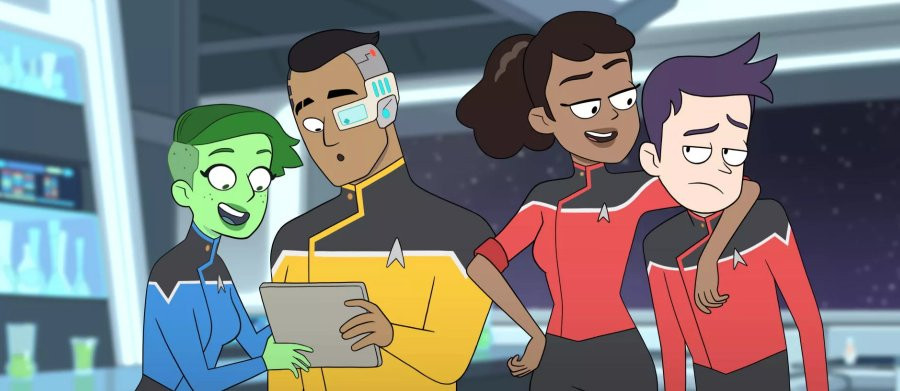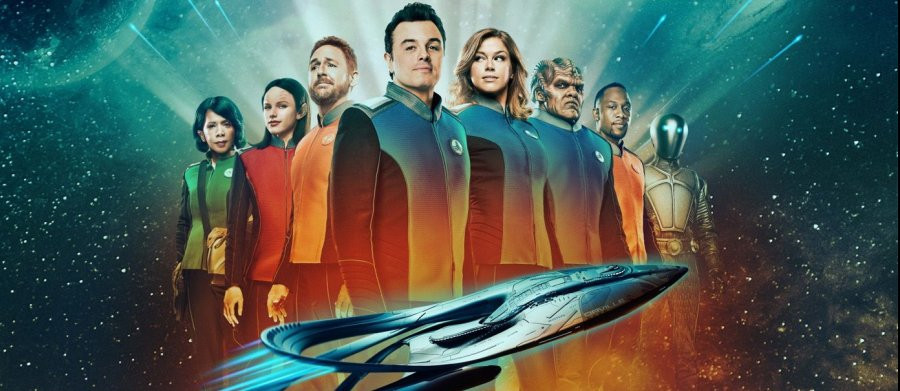
The Orville
2017 - United StatesThis is intended as a spoiler-light review of the first season of The Orville, Seth MacFarlane's humorous tribute to the Star Trek franchise, and in particular to the original 1960s television show that kicked the whole thing off. The basic premise is exactly the same: a starship tasked with exploring Space encounters a new adventure every week. There are differences: unlike the 'Enterprise,' the 'Orville' is only a mid-level command in a fleet of over 3,000 vessels, and the series is set in the 25th Century, later than the original Star Trek - and, of course, The Orville is usually trying to be funny where the original Star Trek was usually trying to be serious. How much either succeeds in their respective objectives may be a matter of legitimate debate.
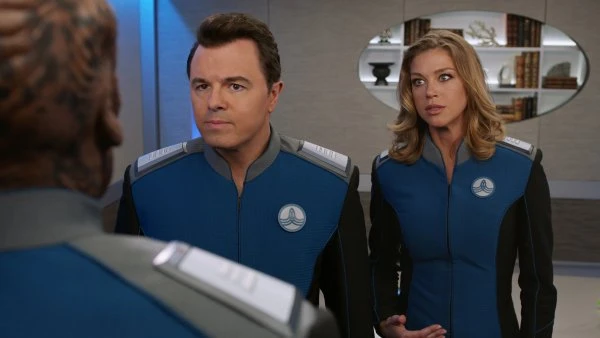
The needy, insecure Captain of 'The Orville,' Ed Mercer (MacFarlane), is about as far from the manly James Tiberius Kirk as it is possible to imagine. His first officer, Commander Kelly Grayson (Adrianne Palicki), just happens to be the wife he divorced after he caught her in bed with a blue skinned alien. That basically says all you need to know about the tone of this piece.
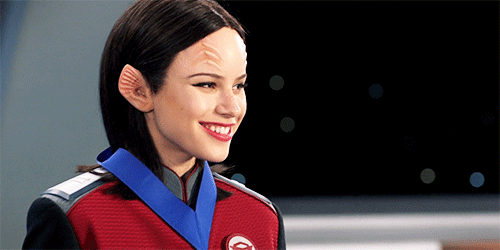
Yet the structure is fairly traditional. We have the usual Star Trek characters. The Spock/Data/Odo/EMH character of the outsider looking in at humanity, perplexed by our emotions, is Isaac (Mark Jackson), the Science Officer, an "artificial lifeform" half way between a Cyberman and Robby the Robot from Forbidden Planet. Peter Macon gives a fine impersonation of Michael Dorn's Worf as Lieutenant Commander Bortus. Halston Sage as Security Officer Alara Kitan is a more likeable version of Tasha Yar from Star Trek: the Next Generation, with a hint of Kira Nerys from Star Trek: Deep Space Nine thrown in. It is refreshing that a logical explanation is given for the modern cliché of a fragile looking girl being stronger than any man: it is due to the gravity on her home planet.
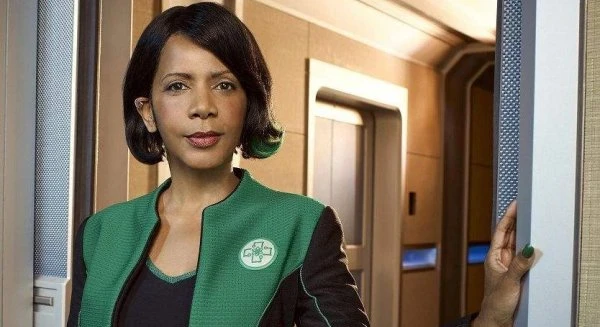
The superb Penny Johnson Jerald, herself a distinguished Star Trek franchise veteran from DS9, in which she played Kasidy Yates, is the Medical Officer, Dr Claire Finn. As such, she gets to do the traditional Leonard McCoy rough compassion, but also shows her as a mother, a lover, and an oddly attractive madwoman. DeForest Kelley never got to do that.
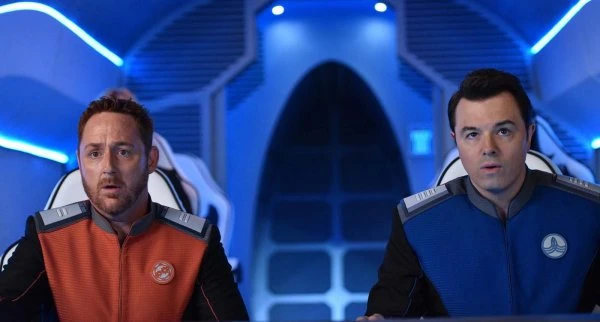
Helmsman Gordon Malloy, played by MacFarlane's frequent collaborator Scott Grimes, strikes a false note: he is far too childish for Star Trek. He seems to have more in common with Alan Tudyk's Wash in Firefly. J Lee as John LaMarr is at first no more than his slightly cooler black friend, but is allowed to mature and is suddenly revealed as a Geordi La Forge character, in an episode which mirrors a TNG one in which Geordi learns about leadership the hard way.
Norm Macdonald is fun as a gelatinous alien Engineer with a generally unrequited passion for Dr Finn. It is one of the great strengths of The Orville relative to the original Star Trek that it has more actual alien aliens among the interspecies crew.

A very impressive list of guest stars includes Rob Lowe (as the blue skinned alien who wrecks Mercer's marriage), Charlize Theron (MacFarlane's co-star in A Million Ways to Die in the West), Liam Neeson (ditto), Jeffrey Tambor, Chad L Coleman, Robert Knepper, Brian George, and Robert Picardo, who is best known as the EMH in Star Trek: Voyager. MacFarlane seems to have made a point of recruiting alumni of the Star Trek franchise to his project: Jonathan Frakes, Robert Duncan McNeill, and Brannon Braga all direct episodes.
The first episode, which set the style for all that followed, was directed by the highly accomplished actor and director Jon Favreau. His subsequent work on The Mandalorian has led to Favreau being hailed as "the man who saved Star Wars" by fans unhappy with Disney's previous handling of that franchise after they bought it from George Lucas. In his work on The Orville, he shows a similar sensitivity to the traditions of another franchise, Star Trek. The scene in which the new Captain first approaches his command by shuttle references similar scenes in the movies very obviously. From that moment, hard core Star Trek fans knew they were in the hands of people who love what they love.
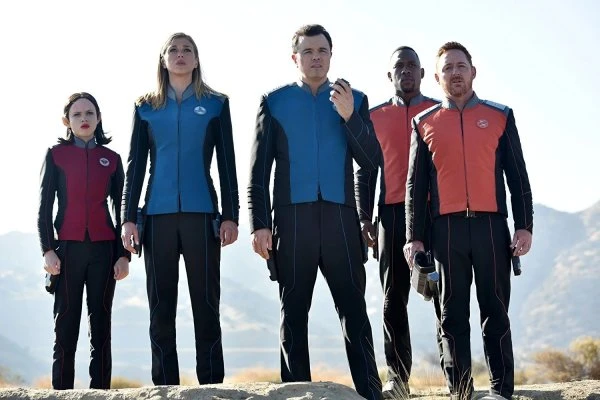
Almost every aspect of the production seems to be an affectionate nod towards some aspect of Star Trek. Most obviously, the brightly coloured uniforms reflect the specialisation of the wearer - and, yes, Security get red. There seems to be no limit to the opportunities for a game of "spot the reference" to Star Trek in any episode of The Orville. Some locations seem oddly familiar.
This respectful imitation extends even to the storylines. So we get the "Crew Members Act Strangely" episode, the "Shuttle Stuck on an Inhospitable Planet" episode, the "Crew Member Alone in an Apparently Empty Starship" episode, the "Trial Scene" episode, the "Crew Member Gets Involved in a Primitive Culture" episode, the "Dangerous Woman" episode, the "Unlikely Infiltration of an Enemy Vessel" episode, and so on.
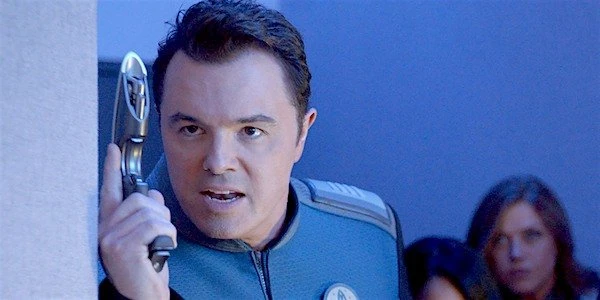
MacFarlane basically gets to live out every fanboy's dream - making his own episodes of his favourite show. On that level, The Orville succeeds quite brilliantly. Other fanboys seem to agree: although professional critics on the 'Rotten Tomatoes' website were generally underwhelmed by the first season of The Orville, the audience score is much higher. This is due in very large part to many Star Trek fans feeling that The Orville has more respect for the traditions of the original show than the recent offerings of the franchise itself.
It should be noted that there is a larger context to all this, small-p and big-P political. The Star Trek fanbase, like the Star Wars fandom, is now deeply split, with many feeling that the beloved franchise of their youth that made them feel so hopeful for the future has become "too gritty" or "too preachy" or both. While they are well aware of the fact that The Orville is meant to be a satire, its well observed evocation of the style of the original gives them a great deal of nostalgic pleasure missing in the likes of Star Trek: Discovery and even Star Trek: Picard.
Without wishing to get into that broader debate - indeed, heartily wishing to avoid it like the plague - it is fair to say that a big difference between the professional critics and the fans is usually the sign of something interesting, and The Orville is nothing if not interesting. That is not necessarily the same as saying it is good.
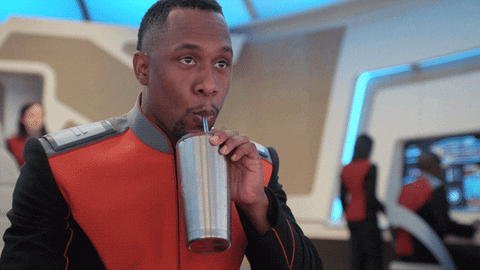
The basic problem in trying to assess The Orville is that it's premise consists of three separate elements: the tribute to Star Trek, the comedy, and the link between the two. It obviously scores very highly in terms of the first element, the tribute, but comedy is always subjective and the linking of the two in the first season is often very clumsy.
Seth MacFarlane resembles Ricky Gervais in that his style of humour is very much a matter of personal taste - or, some might say, lack of taste - as is his on screen persona. Like Gervais, he has a good eye for satire and he likes to take risks. Sometimes these risks pay off spectacularly. Sometimes they, er, do not.
MacFarlane likes to push his own views, which tend to align with the current orthodoxy in Hollywood, especially on religion and recreational narcotics. However, he has a tendency to run with both hare and hounds. As a result, it is sometimes difficult to tell when he is trying to be serious and when he is being satirical. This proves to be a major weakness in The Orville which is structurally a drama. The attempts at humour undermine the dramatic tension and vice versa. The original Star Trek had some charming moments of humour, but they were moments of relaxation. The rest of the time the show, the cast, and the characters all took themselves very seriously. We never forgot that these were highly trained, carefully screened, mentally grounded career military personnel doing very important work in very dangerous situations.

This is what grates about The Orville. Much as MacFarlane, and most of fashionable Hollywood, might prefer to think otherwise, the vanguard of human civilisation in the 25th Century will not be 21st Century style slackers who drink too much, do drugs, and engage in casual hook up sex on missions. Mercer is not a believable starship Captain - or a believable husband to Kelly come to that. Malloy and the early LaMarr are not believable in any position of responsibility. Ironically, only the alien Bortus and the robot-like Isaac strike an authentic note as the sort of people who might be selected to take humanity to new worlds.
All science fiction really says more about the time in which it was written than about the future. This is not necessarily a bad thing. One of the best episodes, 'Majority Rule,' takes us to that old standby, a planet that actually looks a lot like early 21st Century Earth, and makes some telling points about "social media" and the superficiality of public life now. However, the overall picture that The Orville paints of the current state of human civilisation is not a flattering one and suggests we might do well to avoid contact with extraterrestrials until we grow up a bit.
The contrast with the more aspirational generation that produced the original series in the Sixties could not be greater. Of course, it could be argued that one should not get so worked up because it is meant to be a comedy, after all. If so, it should have made up its mind to be a comedy and gone one of two ways - either played it straight faced as a satire in best Police Squad style or gone to the other extreme and played it as a farce. As it is, at the end of the first season at least, we are left with a show that is well produced, well directed, generally well cast and well played, very good looking, and often very clever, but is still curiously uncertain what it wants to be.
Review: John Winterson Richards
John Winterson Richards is the author of the 'Xenophobe's Guide to the Welsh' and the 'Bluffer's Guide to Small Business,' both of which have been reprinted more than twenty times in English and translated into several other languages. He was editor of the latest Bluffer's Guide to Management and, as a freelance writer, has had over 500 commissioned articles published.
He is also the author of ‘How to Build Your Own Pyramid: A Practical Guide to Organisational Structures' and co-author of 'The Context of Christ: the History and Politics of Rome and Judea, 100 BC - 33 AD,' as well as the author of several novels under the name Charles Cromwell, all of which can be downloaded from Amazon. John has also written over 100 reviews for Television Heaven.
John's Website can be found here: John Winterson Richards
Seen this show? How do you rate it?
Seen this show? How do you rate it?
Published on July 25th, 2021. Written by John Winterson Richards for Television Heaven.


